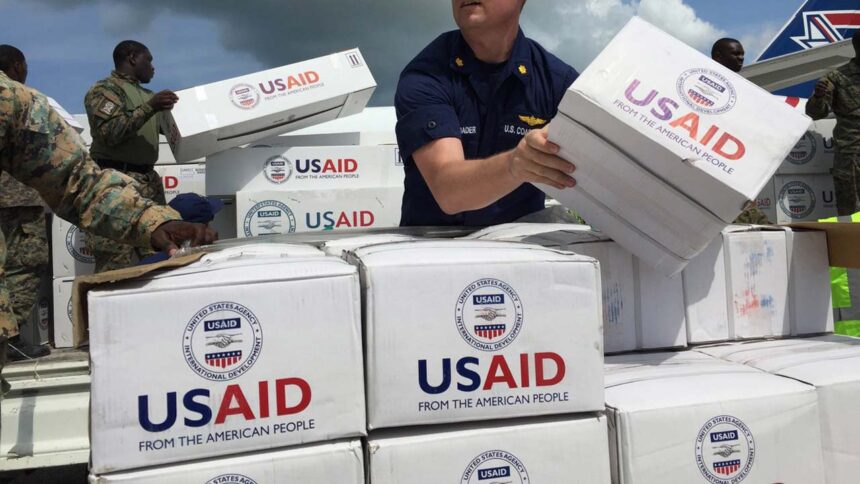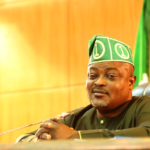Nigeria is poised to lose a significant amount of foreign funds and assistance following President Donald Trump announcement a U.S. Agency for International Development, USAID shutdown.
On Monday, Trump’s billionaire ally and Tesla Chief Executive Officer (CEO), Elon Musk, said the US President has “agreed we should shut it down.”
“It became apparent that it was not an apple with a worm in it. What we have is just a ball of worms. You’ve got to get rid of the whole thing. It’s beyond repair. We’re shutting it down,” Musk added.
Since the USAID shutdown, it was observed that the agency’s headquarter was closed on Monday and employees were told to work remotely.
Also, the website for the USAID has been offline since the announcement.
The USAID shutdown has escalated panic among agencies and countries benefitting from a broad range of initiatives.
In Nigeria, USAID has been actively involved in a broad range of initiatives aimed at improving health, agriculture, education, and governance.
The USAID has spent billions of dollars in Nigeria over the years. The amount spent varies by year and by the type of assistance provided, according to recent USAID official figures as highlighted below.
2020: The USAID provided nearly $505 million in humanitarian assistance to Nigeria.
2021: USAID spent $787 million on development and humanitarian assistance in Nigeria.
2022: USAID provided more than $356 million in assistance to Nigeria.
2023: USAID spent over $317 million on Humanitarian Assistance in Nigeria.
2024: USAID provided nearly $100 million in humanitarian assistance to Nigeria to respond to disasters, including floods.
Agriculture:
USAID has supported over 5 million Nigerian farmers since 2019, enhancing food production and strengthening rural economies.
Health:
HIV/AIDS Response: Through the President’s Emergency Plan for AIDS Relief (PEPFAR), USAID has significantly contributed to Nigeria’s fight against HIV/AIDS. By 2021, USAID was supporting testing for 2.4 million Nigerians annually and providing antiretroviral therapy to 89% of those diagnosed, impacting nearly 400,000 individuals.
Malaria Control: USAID has protected 68 million Nigerians from malaria through the distribution of mosquito nets under the President’s Malaria Initiative (PMI), which has contributed to a 16% reduction in child deaths over a decade and a decrease in malaria prevalence from 42% to 23%.
Maternal and Child Health: USAID’s health programs have benefited 62 million Nigerian mothers and children through training health workers, increasing access to quality medicines, and bolstering primary health care leadership.
Education:
Literacy and Early Grade Reading: USAID has helped millions of children and youth improve literacy, particularly focusing on those whose education was disrupted due to conflict, aiding over 340,000 children in this regard.
Educational System Strengthening: In northern states like Adamawa, Bauchi, Gombe, and Yobe, where educational access has been disrupted by insurgency, USAID’s activities have aimed at providing educational continuity, improving teaching quality, and integrating peacebuilding into school communities.
WASH (Water, Sanitation, and Hygiene):
Through the Effective Water and Sanitation Hygiene Services (E-WASH) project, USAID addresses water and sanitation challenges in six Nigerian states, enhancing health and hygiene through better service delivery.
Nutrition:
USAID Advancing Nutrition worked in Nigeria to improve nutrition through technical support, innovative interventions, and generating evidence for better programming across five states.
Meanwhile, the USAID budget totaled $43.4 billion in fiscal year 2023, according to the Congressional Research Service (CRS), and approximately 130 countries received USAID assistance.
USAID has distributed more than $30 billion in direct financial support to Ukraine, which is currently at war with Russia, between fiscal years 2022 and 2024, according to the CRS.
Recall Pan-Atlantic Kompass earlier reported that President Trump had also pulled the United States out of the World Health Organization following his return to power last month. As his current administration continues to grind scores with multilateral institutions, it is not clear yet how things will shape up around the world to enable developing countries like Nigeria fill the huge gap left behind by the US as per the funding of intervention programmes in countries.
Reacting to the USAID shutdown and other global disruptions occasioned by Trump 2.0, Nigeria’s Federal Executive Council (FEC) said it has set up a multi-ministerial committee to develop a transition and sustainability plan to mitigate potential funding disruptions, especially as they affect HIV, Tuberculosis and Malaria treatment in the country.
“A multi-ministerial committee, including representatives from the ministries of finance, health, defense, and environment, as well as the governors’ forum, has been tasked with developing a transition and sustainability plan to mitigate potential funding disruptions,” Coordinating Minister of Health and Social Welfare, Dr Ali Pate told journalists on Monday.
“This administration is committed to ensuring that those receiving treatment do not experience interruptions.”
“We appreciate the US government’s contributions over the years and remain committed to a constructive partnership while strengthening Nigeria’s healthcare system with domestic resources,” Pate said, disclosing that FEC has approved a total of $1.07 billion in financing for healthcare sector reforms under the Human Capital Opportunities for Prosperity and Equity (HOPE) programme. He added that N4.8 billion was also allocated for HIV treatment in the country to mitigate against current global shocks.





